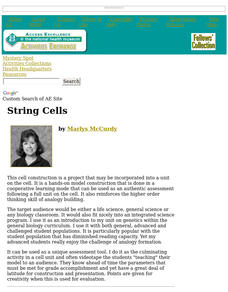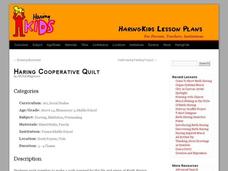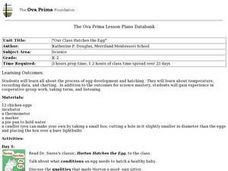Safe Drinking Water Foundation
Water Bottles Everywhere
Young environmentalists examine how water bottle use is polluting the waters on our earth. In groups, your students study the handout on their assigned topic and present their findings to the rest of the class. Leading up to this...
Curated OER
String Cells
Use this resource to have your class learn about the cell. This resource walks learners through the construction of a model of a cell. This project is completed in a cooperative learning group, and reinforces the higher-order...
Curated OER
Back to the Past
What was the Untied States like in 1938? What were the concerns of Americans in the post World War I era? What were their fears? What were their sources of news and entertainment? To understand the reaction to Orson Welles' radio...
Curated OER
Finding Promise in Compromise
Examine how the 'safe passage' for Palestinians between the Gaza Strip and the West Bank affects those living in Israel and reflects both conflict and cooperation between the Israelis and Palestinians. The class compares the perspective...
Curated OER
Haring Cooperative Quilt
Students inspect visual arts by examining images on the web. In this art history instructional activity, students discuss the history of art after researching Keith Haring's work on the Internet. Students analyze...
Curated OER
A Book a Day Will Keep the Teacher Away
Students work in cooperative groups to read a book in a day. Each group is assigned a portion of the book to read and uses the jigsaw learning strategy to review the book as a whole class.
Curated OER
Love and Friendship
Third graders do a hands-on activity after being read aloud the story of The Rag Coat, in cooperative groups.
Curated OER
What's for Dinner? (Using Adjectives)
Sixth graders use adjectives to describe foods listed in restaurant menus. In cooperative groups, 6th graders create menus and identify the adjectives used in the menu created by their group.
Curated OER
Bats, Bats, Everywhere!
Students research information on bats while working in cooperative groups. They design posters with the information from their research.
Curated OER
Native Americans of the USA
Students, in cooperative groups, research a variety of Native American tribes on the Internet and complete corresponding activities. They participate in a play about Native Americans by Sandra Widener.
Curated OER
Author's Purpose
Students discuss and define what folk and fairy tales are. In this literature lesson, students construct their own working definitions for folk and fairy tales. Students choose to work as a class or in cooperative groups. Then students...
Curated OER
Wild Animal Investigation - Habitat Diorama
Students research wild animals in cooperative groups and use their information to construct habitat dioramas. They demonstrate competence in using different information sources, including those of a technical nature, to accomplish...
Curated OER
Questions About Rivers
Students investigate rivers. In this geography lesson, students work in cooperative groups to read about rivers from articles they have collected. Students form questions using Bloom's Taxonomy as a guide.
Curated OER
Explaining the Bill of Rights
Students define the terms Bill of Rights and amendment. They successfully explain the meaning of each amendment of the Bill of Rights. Students work together in cooperative groups.
Curated OER
Create a Word
Brainstorm new words for a class dictionary. In small groups, young learners read and discuss an article about how words get into dictionaries. They then develop a new word, use it in a sentence, and share their creations with their...
Curated OER
Writing American Diaries
Young scholars examine the concept of historical perspective in writing. They read the diary of Sally Wister, a young Patriot from Philadelphia during the Revolutionary Era. Additionally, they must include different points of view in...
Curated OER
What is Bullying?
Students brainstorm ideas or create a definition of what bullying is. They write their ideas on the board. They then break into cooperative groups giving each group a form of bullying from a list and discussing it among themselves.
Rutgers University
How the Allies Won World War II: Island-hopping in the Central Pacific
Using primary source documents, young historians explore the strategies the US used to defeat Japan during WWII. They also learn about the American military experience, and innovations that changed the style of warfare. Young scholars...
Curated OER
Economic Concepts and Definitions
Third graders identify producers and consumers in SE Utah and Four-Corners communities. They identify the factors that determine economic development and name some occupations in their community. They show and share their graphic...
Curated OER
Drafting the Gettysburg Address
Students, in groups, compare and contrast Abraham Lincoln's drafts and final version of the Gettysburg Address. They explain the differences between the final version and drafts of the Gettysburg Address.
Curated OER
"Our Class Hatches the Egg"
Students research all about the process of egg development and hatching. They access about temperature, recording data, and charting. In addition to the outcomes for science mastery, students gain experience in cooperative group work,...
Curated OER
Language Arts: Ode to the Ordinary
Eighth graders select ordinary objects, determine their uses, and write poems about them. Once they select an object, they create a web about its uses to serve as an outline. Once they have written their own odes, 8th graders meet in...
Curated OER
We Can't Decide
Second graders investigate decision making skills that they can apply on a daily basis. In this decision making lesson, 2nd graders listen to a read aloud of Pinocchio and make a list of times when decisions have to be made. They access...
Southern Nevada Regional Professional Development Program
“Double Double Speak Speak”
Bilateral suborbital hematoma? Call an audible? 404? Have fun with “the twittering or warbling of birds,” or as 14th century French speakers would say, have fun with “jargon.” Groups match specialized jargon with plain speech, decode...























